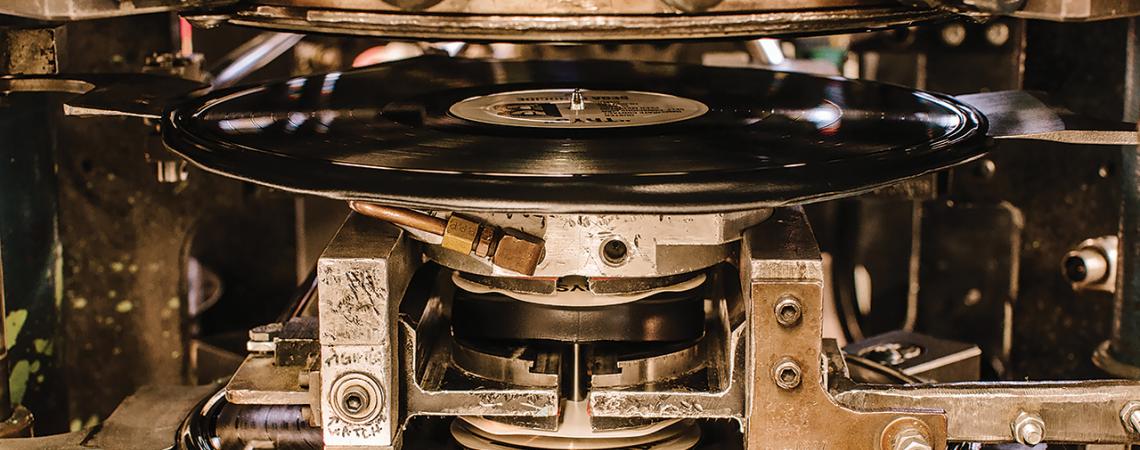A newly pressed record comes off of the stamper at Gotta Groove Records.
When Vince Slusarz and Matt Earley teamed up to open Gotta Groove Records in Cleveland, a casual music fan might have wondered if they were out of their minds. In 2009, the facility was one of the first new record-pressing plants to open in decades — long after sales of vinyl LPs had been eclipsed by CDs, downloads, and music-streaming services.
According to the Recording Industry Association of America (RIAA), vinyl sales hit rock bottom in 2005, when they accounted for less than 1 percent of industry revenues. But Slusarz (a former executive at Newbury-based manufacturer Kinetico) and Earley (a record wholesaler) both felt that vinyl was about to experience significant growth, while existing manufacturing capacity was limited.
“A lot of the new records were being made by indie rock acts, but there weren’t enough copies being made,” Earley says. “It was a challenge at the wholesale level because once a record sold out, it was a long time before you could get more pressed.”
Slusarz had retired and was interested in starting his own company — one that would create manufacturing jobs in the region. He was a longtime fan of vinyl and took note when his college-age daughter started buying new vinyl records.
“I looked at the statistics and saw that vinyl sales were creeping up, and I wondered if there could be a potential business in it,” Slusarz says.
Slusarz had to clear two hurdles, though: He didn’t know anything about making records, and there hadn’t been any new record presses made in decades. He was able to buy his first presses from a New Jersey plant that was about to shut down. He drafted a mechanic from his former company to help set up the equipment.
Earley, meanwhile, had come to a similar conclusion about the vinyl market. He reached out to the same New Jersey pressing plant to make an offer on the equipment, but Slusarz already had the presses. Earley made contacted Slusarz, and after a few months of meetings, he stepped in as Gotta Groove’s vice president of sales and marketing.
Sounds of success
Gotta Groove almost immediately attracted clients because of the dearth of pressing plants in the U.S. at the time (there are now around 30), but Slusarz has since grown the business by targeting underserved clientele. While roughly 20 percent of Gotta Groove’s business comes from major labels, the company primarily fills a niche by providing one-stop-shop record production and distribution services for smaller labels and independent artists.
Gotta Groove occupies part of a sprawling, century-old industrial complex that used to house Tyler Elevator Products. A few dozen employees (many of them local musicians themselves) work at the factory, which operates eight presses and two shifts.
Making a record is a multistage process. Master recordings are first transformed into a lacquer disc, which is used to create a two-part metal stamper. Those stampers are affixed to the record presses at Gotta Groove, where chunks of raw vinyl are pressed between them, like batter in a waffle iron. Cold water stiffens the vinyl, and after the excess is trimmed off the edges, the records drop into a stack. Quality control staff inspect the records and listen to a sample of each batch before they are packaged and prepared for shipping.
Slusarz’s bet on vinyl has paid off. The RIAA reports that vinyl sales rose from $66 million in 2009 to $395 million in 2017. Gotta Groove now presses 1 million records or more each year — everything from a reissue of Fleetwood Mac’s Greatest Hits to local indie releases. They also press records for a number of Ohio-based labels, including Rockathon Records, home to Dayton-based indie rock veterans Guided by Voices.
“There’s a desire among people to own something tactile and physical, and there’s some backlash to digital music, too,” Slusarz says. “For younger people, there’s also a social aspect to vinyl. No one says, ‘Come over to my house and listen to streaming music.’ But you can invite people over to put on records, and they can thumb through your albums while they listen. It’s a pleasurable experience.”









